
Agnieszka Holland was born on 28th November 1948 in Warsaw.
In 1971, she graduated from the faculty of film/TV studies at the Academy of Performing Arts (FAMU) in Prague. After returning to Poland she worked as an assistant director for Krzysztof Zanussi, she co-directed such films as: “Listy naszych czytelników” and “Zdjęcia próbne”. Her feature debut, “Aktorzy prowincjonalni” (“Provincial actors”) received the International Critics Prize at the 1980 Cannes Film Festival.
Due to the introduction of the martial law in Poland Agnieszka Holland decided to live and work in the West. She moved to Germany, France and later to the US. Her films won numerous awards both at Polish and foreign film festivals. The director received three Oscar award nominations. Since 2014, she has been chairwoman of the European Film Academy. Apart from film making, Agnieszka Holland also devoted herself to translating Czech literature into Polish, for instance: “The Unbearable Lightness of Being” by Milan Kundera.
Today, she shares her life between France and the US.
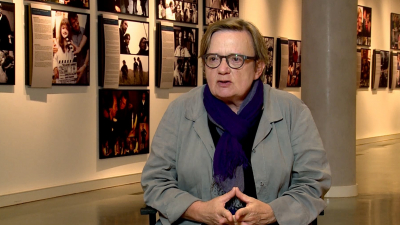
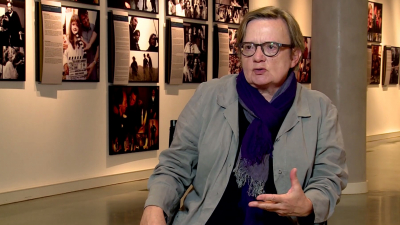
I wasn’t sure, and I even didn’t hope that I could make films abroad. It seemed impossible to me. On the other hand, it opened some new, unknown path and I think that my curiosity pushed me in that direction, to take a risk and choose that path. Anyway, there were major tensions back then, I had been separated with my child, and my daughter was 9 at the time, I had been separated with my husband, with my family that I had been really attached to, I had to part with everything. The separation with my child was the most stressful for me. I had a breakdown, it’s like I fell ill, and it helped me because my friends, Krzysztof Kieślowski, started a campaign and finally the authorities agreed for Kasia and her father to leave Poland and join me in Paris.
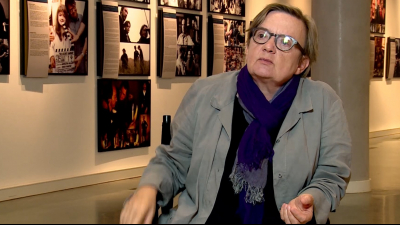
I associated the immigrants with this 19-century willingness to leave the country and build one's life somewhere else. For a very long time I had this feeling of temporariness. I did not give up my citizenship, nor did I ask for asylum, which would have made it so much easier for me to function because I would have obtained some kind of a passport which would allow me to function more freely, but, because I did not ask for asylum, they did not know what to do with me. My Polish passport expired very fast. It was not renewed, of course. I got issued a travel document which looked like a fan, a weird kind of a paper fan. Every time I crossed the border, I needed a permission to come back to France, so I spent long hours at the Prefecture of Paris. And every time at the border they were taking very long to check my document because I think that it was still this kind of a Nansen passport. I don't know why I paid attention to such elements. I sort of thought that it somehow cast a spell on the reality, that I was not an immigrant, but a temporary political refugee.
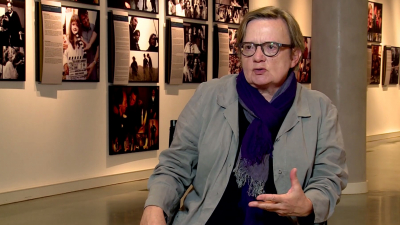
I have a really strong feeling of national solidarity so the various actions I undertook there, in France, during my first year of stay, were the fruit of that patriotic need I had. And later, for all those years of martial law, not mentioning the “To Kill a Priest” film, I’ve been motivated to speak about the Polish experience and to speak about it in such a way so that people can understand it and to awake the feeling of solidarity in them. This motivation was really strong in me. Anyway, I had been rubbing shoulders with such emigrants. Some of them emigrated after 1968, so they were the Polish Jews, but others were the members of an older emigration wave. Right from the start, there was this National Democracy emigration. Its members weren’t numerous in Paris but in London, the US and Canada this emigration was really strong. I kept contacts with them, I tried not to have any conflicts with them, but I had felt such detachment of ideas with them, so I wanted to keep in touch with people that shared my beliefs. And, back then, I befriended Konstanty Jeleński and Józef Czapski. Those people were really something. They showed me the Polishness that I hadn’t known before. Such totally free Polishness. Free from the communist decay and free from the nationalist decay. At the same time, they were very Polish and high-life. And, in their mind, the one thing didn’t exclude the other. I mean that they were the citizens of the world but, at the same time, they were very Polish, affirming this Polish element that seemed the most intriguing to me. And, when I got to know them and made friends with them I saw to what extent the life in the Polish People’s Republic diminished even the smartest and the most wonderful people, distorting their perspective. Meeting those Poles was one of the most wonderful experiences during my first period of emigration.

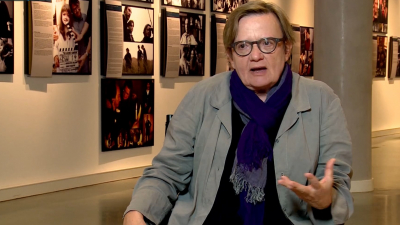
The Polish character changes the most now, when I'm in Poland. When I come to Poland and I see that... the Poles can very easily waste the capital of freedom that they have acquired, to a large extent on their own, and how many negative phenomena occur here that arise from this kind of incredible hatred, envy. It is here that I am overwhelmed by this kind of discouragement. However, when I was in Poland... when I was outside of Poland, no, I don't think that it has changed. That is, of course I met people from these immigrant societies...which I conventionally called national democrats, which were hard to spot in Poland. Back then it was kind of frozen, this stream of Polish culture, very catholic, nationalistic and xenophobic, even sometimes racist, anti-Semitic for sure. So this stream, it was not clear in the Polish life, even in the opposition it was kind of hidden. And then it somehow got unfrozen in the 1990s, and now it is very present in the social language in Poland. During the emigration, it was always there, it seemed to me weirdly anachronist, because I did not know it from my earlier life in Poland. Well, Poland was not a normal country, let's admit that, but this life was normal to me. It was my country, I was born and raised there, etc. It was an interesting experience, I discovered these extremes of the Polish culture during the immigration, because I discovered what seemed to me the most wonderful, free and universal, but also what was somehow parochial, reducing, envious, or even full of hatred.




